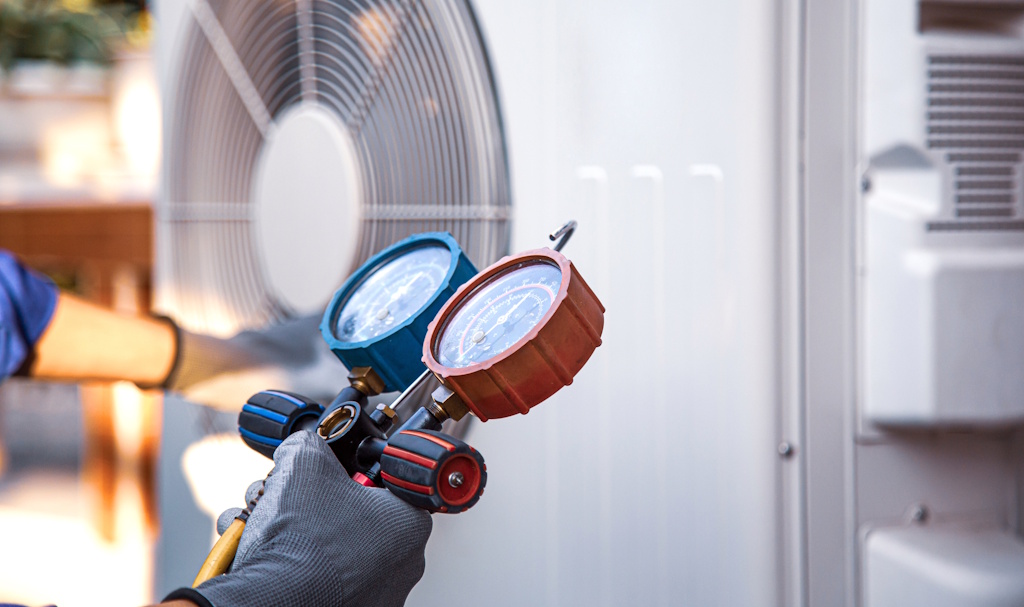Learn How to Spot Capacitor Issues, Frozen Coils, and Other AC Problems
In the face of unrelenting Midwestern summer heat and humidity, your air conditioner is one of the most important systems in your home. However, just like any machinery that uses moving parts and components, AC units can develop issues over time.
Familiarizing yourself with the most common AC problems and how technicians fix them can help you act fast and keep cooling disruptions to a minimum.
Capacitor Issues
Capacitors are small electrical parts that help power the motors inside your AC unit. When a capacitor fails, your AC may shut down after running for only a few minutes, or worse, it may not start at all.
Signs of a bad capacitor include clicking sounds when the unit tries to turn on, the fan not spinning, or warm air blowing instead of cool air. A trained technician can test the capacitor to confirm if it’s faulty and replace it.
This is one of the more affordable fixes, but left untreated, it can cause more serious damage, increasing your AC unit system repair cost.
Frozen Coils
Evaporator coils need warm air flowing over them to properly function. When airflow is blocked due to dirty filters or low refrigerant, the coils can get too cold and freeze. Frozen evaporator coils can cause your AC to stop blowing cold air or stop working altogether.
Signs of frozen coils include ice buildup on the indoor unit or refrigerant lines, warm air from vents, and higher humidity indoors. Technicians solve this issue by first thawing the coils. They’ll then check for the root cause, such as airflow problems or refrigerant issues, and make the necessary AC repairs and adjustments to prevent it from happening again.
Refrigerant Leaks
Refrigerant is the liquid that cools the air inside your home. If your system has a leak, it loses cooling capability. You might hear a hissing sound, notice reduced airflow, or see ice on the coils.
A technician will use leak detectors to find the exact location of the leak. After the tech finds the leak, they will seal it and replenish the system with the proper amount of refrigerant. Quickly fixing leaks helps avoid comfort disruptions and keeps your AC unit system repair costs under control.
Thermostat Issues
Sometimes the problem isn’t with the AC unit; it’s with the thermostat. If your thermostat is not providing an accurate temperature reading or not sending the right signals to the AC, the system may experience operational issues.
A technician will check if the thermostat is properly calibrated and communicating with the AC unit. In some cases, a new thermostat may be needed. Smart thermostats can also offer more efficient control of your cooling system after a common AC problem like this is resolved.
Dirty Filters
One of the simplest but most common causes of AC trouble is a dirty air filter. When filters get clogged, they block airflow, which can cause frozen coils, poor cooling performance, and added strain on the system.
During an AC repair visit, technicians often begin by checking the air filter. Replacing a dirty filter is easy. Doing it regularly helps prevent bigger issues and can reduce your AC unit system repair cost over time.
Electrical Issues
Your AC system relies on several electrical components to run smoothly. If a fuse blows, wires are damaged, or connections come loose, your system may stop working or run poorly. Signs of electrical issues include the AC shutting off suddenly, not turning on, or tripping the circuit breaker.
HVAC technicians use meters to test voltage and connections. After they identify the issue, they can replace or repair faulty wiring to restore safe, reliable power to your AC unit.
Unusual Sounds or Odors
If your air conditioner starts producing strange noises or odd smells, something is likely wrong inside the unit. Unusual sounds are typically caused by loose parts, failing motors, or debris in the fan. Bad odors often come from mold inside the ducts or burnt wires in the system.
AC professionals will inspect the system, clean internal parts, and replace anything that’s worn or damaged. This kind of AC repair can also improve air quality and extend the life of your system.
Blocked Drain Lines
Your AC doesn’t just cool your home; it also removes humidity. This moisture exits through a drain line. Over time, the drain can become clogged with debris, leading to leaks or water damage. Signs of a blocked drain line include water around the indoor unit, musty smells, or your system shutting down.
A technician can flush the drain line and clear the blockage. This simple repair can prevent water damage and mold growth while promoting a longer system lifespan.
Prevent the Need for AC Repairs With a Proactive Approach
What we covered are just some of the common AC problems homeowners face, especially during the summer months. Whether it’s a dirty filter or a more serious refrigerant leak, fast action is key to keeping your home cool and your AC unit system repair cost low.
If your system isn’t running right or you’ve noticed something unusual, don’t wait. Proactive, professional AC repair helps extend the life of your system, improve efficiency, and prevent small problems from turning into big ones.
When in doubt, contact a trusted AC repair technician to inspect your system and get it back in good working order. Regular maintenance and prompt fixes are the best way to stay comfortable all season long.



